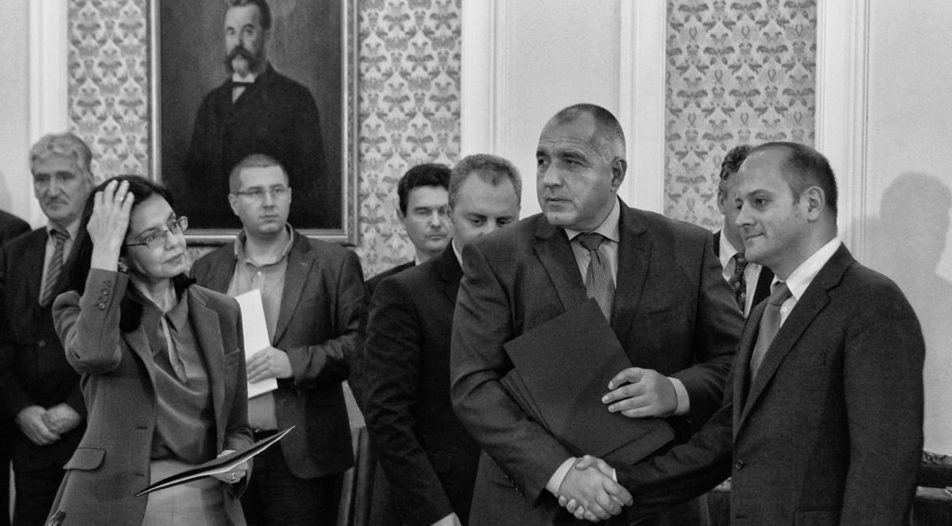"We have white smoke", said Ivan Ivanov from the Bulgarian Agrarian National Union (BZNS), one of the five political parties that make up the right-wing Reformist Bloc (RB), when he emerged from the meeting of the Executive Council of the bloc at the beginning of September. The reference to papal election meant that the coalition had finally decided on joint nominees for president (Traycho Traikov, former minister of economy and energy in the first GERB government) and for vice president (Sabi Savev, a retired Maj Gen). But the papal metaphor also signaled the difficulty with which the decision was taken. A couple of hours later the leader of the Union of Democratic Forces (SDS) and Minister of Economy Bozhidar Lukarski disputed the finality of the decision in an interview for the newspaper 24 Hours. Although Mr Lukarski retracted his words later and stood behind Mr Traikov's nomination, the episode showed the disunity that has reigned within the Reformist Bloc ever since it joined the coalition government led by Boyko Borissov in 2014.
The origins of the reformists
The RB, a coalition of five center-right parties, was formed in 2014, as the government of Prime Minister Plamen Oresharski was crumbling and the protest movement of 2013 had accumulated social and political energy for systemic reform. The RB mustered this energy and entered parliament on a platform of anti-corruption action and reform of key sectors - healthcare, education, defense, foreign affairs, economy and most importantly - the highly centralized and non-transparent judiciary. They joined the broad and colorful center-left-right government coalition led by Mr Borissov and were granted the corresponding key ministries, as well as the position of Deputy-PM for the ex-EU Commissioner Meglena Kuneva, one of the leaders of the bloc.
However, in a few months' time it became clear that the RB and their efforts would remain nothing but a facade for GERB's continuous resistance to reform. The dominant party in the government coalition continued to form floating majorities based on the specific interests of both the governing and opposition parties that allowed it to pass controversial bills or block any legislation that would destabilize the status quo. For example, GERB gained BSP's support to take down the main pillars of judicial reform proposed by the RB-backed Justice Minister Hristo Ivanov in December 2015. The undermining of judicial reform made Mr Ivanov resign and some observers expected that the RB would pull out of the government coalition. Only a few of the RB MPs, led by the Democrats for Strong Bulgaria's (DSB) leader Radan Kanev withdrew their support for the government. The rest of the key figures - Meglena Kuneva, leader of the Movement Bulgaria of the Citizens, DBG, (at the time Deputy-Prime Minister), Petar Moskov (Healthcare Minister and Mr Kanev's deputy in DSB), and Nikolay Nenchev (Defense Minister and leader of BZNS) remained loyal to Mr Borissov.
The dilemmas of a disunited bloc
The events surrounding the judicial reform in December 2015 dispelled the image of unity. Since then RB has rarely acted as an entity - Mr Kanev and ten other members of parliament mostly act as opposition, while the rest of the RB MPs back GERB's majority. The bloc almost failed to nominate a presidential candidate and some of its members like Mr Loukarski, who is close to Mr Borissov, played against such nomination.
It is clear that the small member parties of the bloc won't have enough electoral support to get back into parliament if the RB disintegrates before the next elections. On the other hand, the fact that some of them - Mr Nenchev's BZNS, Mrs. Kuneva's DBG and Mr Loukarski's SDS - are willing to cede ground to GERB in its efforts to scale down any attempts for actual reforms make morally illegitimate the very existence of the bloc as a united, reformist entity. The RB supporters are already voting with their feet, with recent polls showing decline in support for the bloc to the levels of the far-right nationalists. Radan Kanev's efforts to brighten up the civic spirit that was initially at the RB's core seem to bear no fruit so far.
"We have white smoke", said Ivan Ivanov from the Bulgarian Agrarian National Union (BZNS), one of the five political parties that make up the right-wing Reformist Bloc (RB), when he emerged from the meeting of the Executive Council of the bloc at the beginning of September. The reference to papal election meant that the coalition had finally decided on joint nominees for president (Traycho Traikov, former minister of economy and energy in the first GERB government) and for vice president (Sabi Savev, a retired Maj Gen). But the papal metaphor also signaled the difficulty with which the decision was taken. A couple of hours later the leader of the Union of Democratic Forces (SDS) and Minister of Economy Bozhidar Lukarski disputed the finality of the decision in an interview for the newspaper 24 Hours. Although Mr Lukarski retracted his words later and stood behind Mr Traikov's nomination, the episode showed the disunity that has reigned within the Reformist Bloc ever since it joined the coalition government led by Boyko Borissov in 2014.












